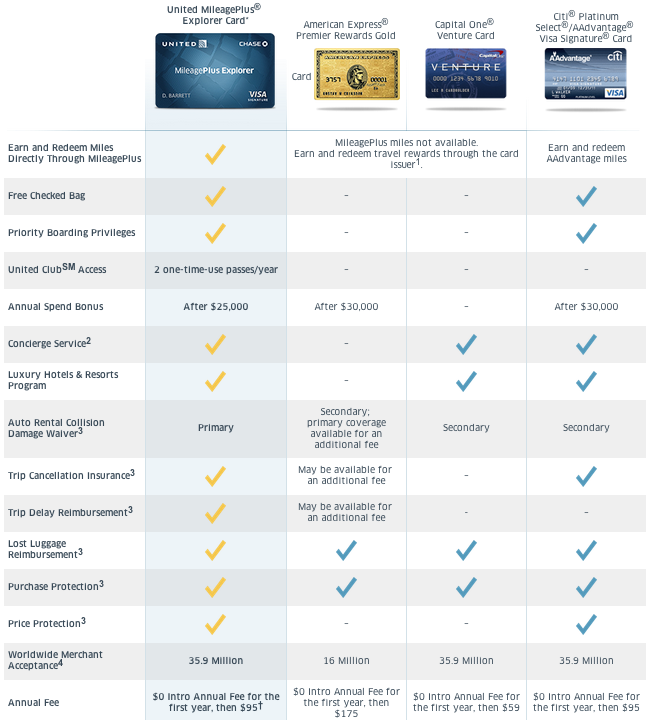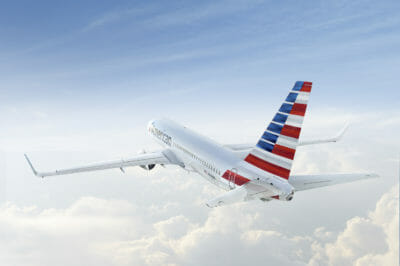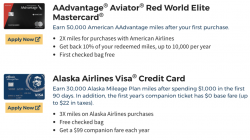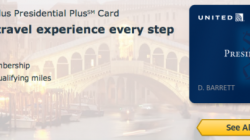Now that United’s MileagePlus program has decided to reduce the number of miles it awards to almost all its customers, the fastest way for many to earn more miles will be through a credit card. Today’s question: Does it have to be one of United’s?
Before we answer that, let’s start with the ultimate goal. You want to fly on United Airlines or one of its partners. You don’t need United miles to do this. And if you did want United miles, you could earn them with many cards that aren’t directly affiliated with the airline.
It’s interesting that the MileagePlus Explorer application page now lists a comparison chart, and yet I don’t think it makes the best choices for comparison. The Capital One Venture Rewards card is widely panned, at least in comparison to the Barclaycard Arrival+, and one of the best choices for comparison is another Chase product — but did you really think they’d include that? 😉 It also chooses a lot of minor comparisons, like price protection, that matter less to me than a better flying experience.
Earning United Miles
Chase offers at most 2 miles per dollar on United ticket purchases with each of its two cards, though its MileagePlus Club card also offers 1.5 miles per dollar on all other purchases (most cards offer only 1 mile per dollar).
Putting that 1.5X bonus aside for the moment, I think many of you know that the Sapphire Preferred is a better way to go for earning United miles in the form of Ultimate Rewards points. The annual fee is the same ($95) as the cheaper MileagePlus Explorer card, and includes a 7% annual dividend so that you actually earn 2.14 points per dollar. You’ll earn them faster because that same 2.14X bonus applies to all travel — United, other airlines, hotels, car rentals, etc. — and also restaurants.
You can transfer your Ultimate Rewards points to United at any time, and even choose to transfer them to your spouse’s account with no fee. If you decide you don’t want to fly United (maybe Alaska or American has award space), you can transfer them to another partner like British Airways. Singapore Airlines is another recent partner and also lets you book on Star Alliance carriers but with more award availability on its own flights than it offers to United customers. Or if flights are particularly cheap, pay for that and use the Ultimate Rewards points to book a hotel with Hyatt, Marriott, or IHG.
In short, more miles, more options, and at no extra cost.
But what about that 1.5X bonus if you have the MileagePlus Club card? First you need to use the United Club. This card is not worth it for most other people since the higher $450 annual fee will wipe out the extra miles earned. Second, take a look at what you actually buy. All travel and dining is pretty broad, and Sapphire Preferred gives you more miles there. You probably have other credit cards, too, and they have their own bonus categories. How much unbonused spend would you really put on the MileagePlus Club card?
Earning Partner Miles
You might decide to forgo earning miles with United altogether. This is my current approach after United announced it was drastically increasing the cost of awards on its partner carriers. I tend to earn my miles on domestic flights and redeem for international flights, and on those international flights I prefer to fly carriers with better service like Lufthansa, Singapore, and Asiana.
By earning miles with these loyalty programs I have access to more award space on their flights, as well as the same saver-level award space that exists on United and other Star Alliance partners. All that really changes are the award chart, the routing rules, and the fees. I tend to book simple round-trip itineraries, so the loss of United’s generous routing rules doesn’t bother me — but it may bother you.
I think that the added fees and fuel surcharges imposed by most foreign carriers are worth it when considering that I don’t have to pay out twice as many miles. And the award chart is often comparable — or in some cases better — by using a partner. For example, Lufthansa has cheaper awards between the U.S. and Europe in every cabin. ANA uses a distance-based award chart that works well in some cases.
You can earn these miles directly with their own co-branded credit cards — Barclays issues one for Lufthansa’s Miles & More — or indirectly by transferring from another program. American Express Membership Rewards will transfer to Air Canada’s Aeroplan and Singapore Airlines’ KrisFlyer. SPG Starpoints will transfer to almost any airline (incidentally, one of the worst transfer partners is United). Ultimate Rewards transfer to KrisFlyer.
There are fewer and fewer reasons to feel locked into MileagePlus just because you want access to some of the world’s greatest airlines.
Card Benefits
Where United manages to stand out with its two co-branded credit cards are in their cardholder benefits. However, these don’t always stand up to rigorous evaluation. Here are the most significant benefits of United’s two credit cards:
Both Cards
- 2 miles per dollar on United ticket purchases
- Group 2 priority boarding (after Premier 1K, Premier Platinum, and premium cabins)
- Access to Standard Award inventory on any flight with seats available
- Eligible for Complimentary Premier Upgrades on award tickets
- Primary car rental insurance
MileagePlus Explorer Visa — $95 annual fee
- 1 free checked bag for primary cardmember and one companion when ticket is booked with the card
- 2 United Club passes each year
MileagePlus Club Visa — $450 annual fee
- 1.5 miles per dollar on all other purchases
- 1 free checked bags for primary cardmember and one companion when ticket is booked with the card
- Priority Access for check-in and security
- United Club membership
- No fee for close-in award bookings
There are lots of benefits here, including a few you can’t get with most other credit cards. But don’t assume any of them are inviolate.
Alaska Airlines does not offer a free checked bag with their credit card. Some people still hold onto it for other valuable perks. US Airways did not offer a free checked bag until it began to align more closely with American Airlines. And conventional frequent flyer wisdom is that you shouldn’t check a bag — let alone two. (I’m probably inviting scrutiny from the Devil’s Advocate here!)
For similar reasons I don’t see much value in better access to Standard Awards, which cost twice as much as the Saver Awards that most people focus on. I didn’t even include in this list that your miles won’t expire; it’s just so easy to keep your miles by making a small 500-mile redemption for a free magazine subscription or similar account activity.
When criticizing the remaining benefits, I think the best approach is to consider your existing relationship with United as a frequent (or not so frequent) customer.
General Members Gain Most
Two United Club passes are ostensibly worth $100 ($50 each) and cover the annual fee. This is better for many people than paying the annual fee for the Sapphire Preferred card since you would need to spend over $70,000 to earn enough points of comparable value in the form of a 7% dividend. However, I don’t think these passes are actually worth $50 each. (Even after conceding that renovated lounges probably make up for downgraded booze.)
The priority boarding is also useful if you are going to be bringing a carry on bag. More and more often the overhead bins fill up, and no one enjoys gate checking a bag even if it’s free.
Other benefits are of little value. Elite members can’t get complimentary upgrades at all, so getting them on award flights doesn’t matter. And while priority check-in and security access sound nice (if you are willing to pay for the $450 Club card), this is another case where you should just check-in online and use the PreCheck line if you can.
Elite Members Gain Least (Absent Lounge Access)
Many of the cardmember benefits don’t apply to elite members. Free checked bag? Priority boarding and security? Already have ’em. I suppose that access to complimentary upgrades on award bookings will make up for this, but keep in mind how hard it is for you to get upgraded on paid bookings. A Premier 1K member will get upgraded on an award after all other Premier 1Ks and before any Premier Platinum members, and so on for each tier after that. There were plenty of times when I still flew United and found that my upgraded didn’t clear as a Premier 1K. What do you think your odds will be as a Premier Gold or Silver on an award ticket?
Premier Platinum and Premier 1K members already get a waived close-in booking fee on award tickets. Again, this may be something they threw in to make the other tiers feel better. Gold and Silvers will rarely get upgraded on awards, but at least they avoid this fee. Just ask yourself: When was the last time you had a close-in award and had to pay it?
I really don’t see a reason for any elite member to get a United credit card unless that card is the MileagePlus Club card, and in that case only for the lounge access. (It’s cheaper than buying it separately.) All the other benefits are gravy. When I had this card, I never used it to buy anything; I just wanted lounge access.
Two Final Benefits
Having picked apart the other benefits, two are left. The first is primary insurance on car rentals. I can appreciate how unique this is (most cards offer secondary coverage that kicks in after your existing insurance), but I think it’s just been beaten to death by bloggers. I rent a car once every two months. I’m happy to pay $25 per rental to American Express so that they’ll offer me premium car rental insurance, or I can let the secondary coverage kick in for free since I sold my car and don’t have car insurance anymore.
If you’re renting every week for work, then maybe it makes sense. But it is not the holy grail of credit card benefits.
The second benefit isn’t widely touted on the credit card offer page, but United does offer a waiver from the Premier Qualifying Dollar requirement toward elite status if you spend $25,000 in a calendar year on one of their cards. This can only be used for Premier Silver, Gold, or Platinum status — not Premier 1K — and you still need to earn the Premier Qualifying Miles.
I think this is only worth it for Premier Platinum status to avoid the change fees on award tickets. But is that really worth spending $25,000 on this card and not some other one with a better category bonus? I think this approach is of more interest to those who do some serious manufactured spend and who have a lot of existing miles, and they can probably evaluate their options using individual circumstances better than I can in a single post.
Conclusion
I titled this post “Why You Shouldn’t Use a United Credit Card” and in the process listed many arguments against the value of these two cards’ various benefits. However, I don’t pretend this is an ironclad case against the cards in all circumstances. In fact, I point out here and there why certain people may still find them useful.
My goal was to break down any false beliefs some people have that an endless list of benefits makes one of these cards a great deal. You can earn United miles with other cards. You may want to earn some other kind of miles and avoid United. You may already have the benefits listed here due to elite status. Or, because you lack elite status, you may not have access to them with or without the card.
I hope one day that United Airlines and Chase sit down to discuss how they can create a credit card that rewards their customers — both elite members and non-elites. One Mile at a Time and I have pointed out that people in Seattle and Portland have an almost fanatical devotion to the Alaska Airlines Visa. I think Delta has some pretty good offers even if their fees are on the high side. I’m prepared to wait for American and US Airways to figure something out.
But United used to have some great cards, including the Presidential Plus card and the Mileage Plus Select card. I was sad to see them go since they offered some unique ways to accelerate your path to elite status as well as higher earning rates (as much as 3X miles on United purchases). We don’t see that anymore. Like much of MileagePlus, these credit cards are additional casualties of the new United Airlines.






